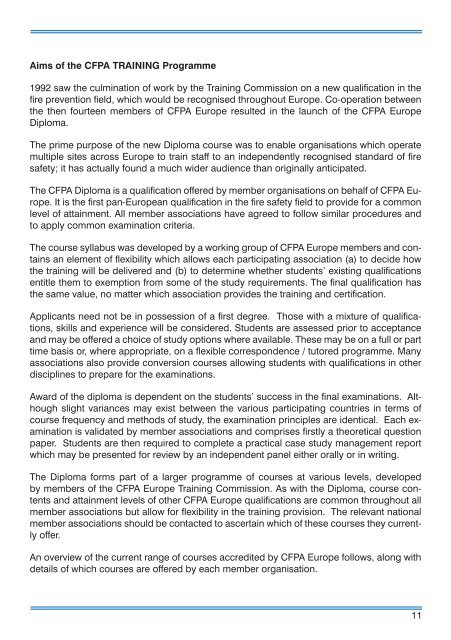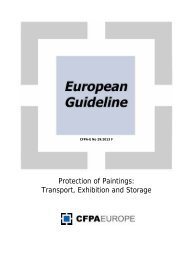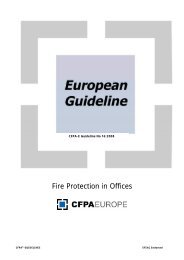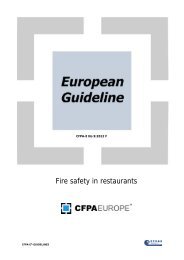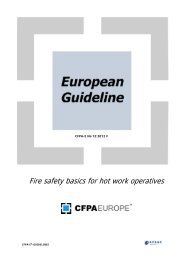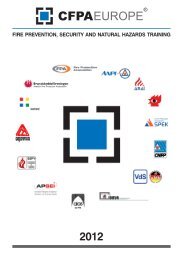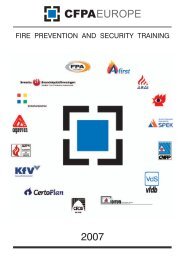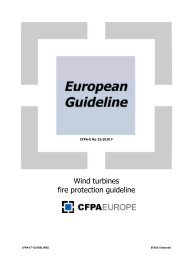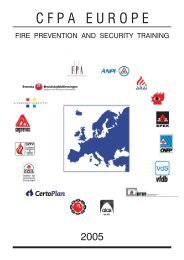- Seite 1: FIRE PREVENTION, SECURITY AND NATUR
- Seite 4 und 5: 2 1 Course Index
- Seite 6 und 7: 4 UK Switzerland Sweden Spain Slove
- Seite 8 und 9: 6 2 The Members of the Training Com
- Seite 10 und 11: 8 3 General Information about the C
- Seite 14 und 15: Support of the CEA Fire / Theft Com
- Seite 16: 14 4 CFPA-E Europe - Diploma Holder
- Seite 19 und 20: REGISTRA- TION N o CFPA EUROPE TRAI
- Seite 21 und 22: REGISTRA- TION N o CFPA EUROPE TRAI
- Seite 23 und 24: REGISTRA- TION N o CFPA EUROPE TRAI
- Seite 25 und 26: REGISTRA- TION N o CFPA EUROPE TRAI
- Seite 27 und 28: REGISTRA- TION N o CFPA EUROPE TRAI
- Seite 29 und 30: REGISTRA- TION N o CFPA EUROPE TRAI
- Seite 31 und 32: REGISTRA- TION N o CFPA EUROPE TRAI
- Seite 33 und 34: REGISTRA- TION N o CFPA EUROPE TRAI
- Seite 35 und 36: REGISTRA- TION N o CFPA EUROPE TRAI
- Seite 37 und 38: REGISTRA- TION N o DK/09/S- CSM/075
- Seite 39 und 40: REGISTRA- TION N o CFPA EUROPE TRAI
- Seite 41 und 42: REGISTRA- TION N o CFPA EUROPE TRAI
- Seite 43 und 44: REGISTRA- TION N o CFPA EUROPE TRAI
- Seite 45 und 46: REGISTRA- TION N o CFPA EUROPE TRAI
- Seite 47 und 48: REGISTRA- TION N o CFPA EUROPE TRAI
- Seite 49 und 50: REGISTRA- TION N o CFPA EUROPE TRAI
- Seite 51 und 52: REGISTRA- TION N o CFPA EUROPE TRAI
- Seite 53 und 54: REGISTRA- TION N o CFPA EUROPE TRAI
- Seite 55 und 56: REGISTRA- TION N o CFPA EUROPE TRAI
- Seite 57 und 58: REGISTRA- TION N o CFPA EUROPE TRAI
- Seite 59 und 60: REGISTRA- TION N o CFPA EUROPE TRAI
- Seite 61 und 62: REGISTRA- TION N o CFPA EUROPE TRAI
- Seite 63 und 64:
REGISTRA- TION N o CFPA EUROPE TRAI
- Seite 65 und 66:
REGISTRA- TION N o CFPA EUROPE TRAI
- Seite 67 und 68:
REGISTRA- TION N o CFPA EUROPE TRAI
- Seite 69 und 70:
REGISTRA- TION N o CFPA EUROPE TRAI
- Seite 71 und 72:
REGISTRA- TION N o CFPA EUROPE TRAI
- Seite 73 und 74:
REGISTRA- TION N o CFPA EUROPE TRAI
- Seite 75 und 76:
REGISTRA- TION N o CFPA EUROPE TRAI
- Seite 77 und 78:
REGISTRA- TION N o CFPA EUROPE TRAI
- Seite 79 und 80:
REGISTRA- TION N o CFPA EUROPE TRAI
- Seite 81 und 82:
REGISTRA- TION N o CFPA EUROPE TRAI
- Seite 83 und 84:
REGISTRA- TION N o CFPA EUROPE TRAI
- Seite 85 und 86:
REGISTRA- TION N o CFPA EUROPE TRAI
- Seite 87 und 88:
REGISTRA- TION N o CFPA EUROPE TRAI
- Seite 89 und 90:
REGISTRA- TION N o CFPA EUROPE TRAI
- Seite 91 und 92:
REGISTRA- TION N o CFPA EUROPE TRAI
- Seite 93 und 94:
REGISTRA- TION N o CFPA EUROPE TRAI
- Seite 95 und 96:
REGISTRA- TION N o CFPA EUROPE TRAI
- Seite 97 und 98:
REGISTRA- TION N o CFPA EUROPE TRAI
- Seite 99 und 100:
REGISTRA- TION N o CFPA EUROPE TRAI
- Seite 101 und 102:
REGISTRA- TION N o CFPA EUROPE TRAI
- Seite 103 und 104:
REGISTRA- TION N o CFPA EUROPE TRAI
- Seite 105 und 106:
REGISTRA- TION N o CFPA EUROPE TRAI
- Seite 107 und 108:
REGISTRA- TION N o CFPA EUROPE TRAI
- Seite 109 und 110:
REGISTRA- TION N o CFPA EUROPE TRAI
- Seite 111 und 112:
REGISTRA- TION N o CFPA EUROPE TRAI
- Seite 113 und 114:
REGISTRA- TION N o CFPA EUROPE TRAI
- Seite 115 und 116:
REGISTRA- TION N o CFPA EUROPE TRAI
- Seite 117 und 118:
REGISTRA- TION N o CFPA EUROPE TRAI
- Seite 119 und 120:
REGISTRA- TION N o CFPA EUROPE TRAI
- Seite 121 und 122:
REGISTRA- TION N o CFPA EUROPE TRAI
- Seite 123 und 124:
REGISTRA- TION N o CFPA EUROPE TRAI
- Seite 125 und 126:
REGISTRA- TION N o CFPA EUROPE TRAI
- Seite 127 und 128:
REGISTRA- TION N o CFPA EUROPE TRAI
- Seite 129 und 130:
REGISTRA- TION N o CFPA EUROPE TRAI
- Seite 131 und 132:
REGISTRA- TION N o CFPA EUROPE TRAI
- Seite 133 und 134:
REGISTRA- TION N o CFPA EUROPE TRAI
- Seite 135 und 136:
REGISTRA- TION N o CFPA EUROPE TRAI
- Seite 137 und 138:
REGISTRA- TION N o CFPA EUROPE TRAI
- Seite 139 und 140:
REGISTRA- TION N o CFPA EUROPE TRAI
- Seite 141 und 142:
REGISTRA- TION N o CFPA EUROPE TRAI
- Seite 143 und 144:
REGISTRA- TION N o CFPA EUROPE TRAI
- Seite 145 und 146:
REGISTRA- TION N o CFPA EUROPE TRAI
- Seite 147 und 148:
REGISTRA- TION N o CFPA EUROPE TRAI
- Seite 149 und 150:
REGISTRA- TION N o CFPA EUROPE TRAI
- Seite 151 und 152:
REGISTRA- TION N o CFPA EUROPE TRAI
- Seite 153 und 154:
REGISTRA- TION N o CFPA EUROPE TRAI
- Seite 155 und 156:
REGISTRA- TION N o CFPA EUROPE TRAI
- Seite 157 und 158:
REGISTRA- TION N o CFPA EUROPE TRAI
- Seite 159 und 160:
REGISTRA- TION N o CFPA EUROPE TRAI
- Seite 161 und 162:
REGISTRA- TION N o CFPA EUROPE TRAI
- Seite 163 und 164:
REGISTRA- TION N o CFPA EUROPE TRAI
- Seite 165 und 166:
REGISTRA- TION N o CFPA EUROPE TRAI
- Seite 167 und 168:
REGISTRA- TION N o CFPA EUROPE TRAI
- Seite 169 und 170:
REGISTRA- TION N o CFPA EUROPE TRAI
- Seite 171 und 172:
REGISTRA- TION N o CFPA EUROPE TRAI
- Seite 173 und 174:
REGISTRA- TION N o CFPA EUROPE TRAI
- Seite 175 und 176:
REGISTRA- TION N o CFPA EUROPE TRAI
- Seite 177 und 178:
REGISTRA- TION N o CFPA EUROPE TRAI
- Seite 179 und 180:
REGISTRA- TION N o CFPA EUROPE TRAI
- Seite 181 und 182:
REGISTRA- TION N o CFPA EUROPE TRAI
- Seite 183 und 184:
REGISTRA- TION N o CFPA EUROPE TRAI
- Seite 185 und 186:
REGISTRA- TION N o CFPA EUROPE TRAI
- Seite 187 und 188:
REGISTRA- TION N o CFPA EUROPE TRAI
- Seite 189 und 190:
REGISTRA- TION N o CFPA EUROPE TRAI
- Seite 191 und 192:
REGISTRA- TION N o CFPA EUROPE TRAI
- Seite 193 und 194:
REGISTRA- TION N o CFPA EUROPE TRAI
- Seite 195 und 196:
REGISTRA- TION N o CFPA EUROPE TRAI
- Seite 197 und 198:
REGISTRA- TION N o CFPA EUROPE TRAI
- Seite 199 und 200:
REGISTRA- TION N o CFPA EUROPE TRAI
- Seite 201 und 202:
REGISTRA- TION N o CFPA EUROPE TRAI
- Seite 203 und 204:
REGISTRA- TION N o CFPA EUROPE TRAI
- Seite 205 und 206:
REGISTRA- TION N o CFPA EUROPE TRAI
- Seite 207 und 208:
REGISTRA- TION N o CFPA EUROPE TRAI
- Seite 209 und 210:
REGISTRA- TION N o CFPA EUROPE TRAI
- Seite 211 und 212:
REGISTRA- TION N o CFPA EUROPE TRAI
- Seite 213 und 214:
REGISTRA- TION N o CFPA EUROPE TRAI
- Seite 215 und 216:
REGISTRA- TION N o CFPA EUROPE TRAI
- Seite 217 und 218:
REGISTRA- TION N o CFPA EUROPE TRAI
- Seite 219 und 220:
REGISTRA- TION N o CFPA EUROPE TRAI
- Seite 221 und 222:
REGISTRA- TION N o CFPA EUROPE TRAI
- Seite 223 und 224:
REGISTRA- TION N o CFPA EUROPE TRAI
- Seite 225 und 226:
REGISTRA- TION N o CFPA EUROPE TRAI
- Seite 227 und 228:
REGISTRA- TION N o CFPA EUROPE TRAI
- Seite 229 und 230:
REGISTRA- TION N o CFPA EUROPE TRAI
- Seite 231 und 232:
REGISTRA- TION N o CFPA EUROPE TRAI
- Seite 233 und 234:
REGISTRA- TION N o CFPA EUROPE TRAI
- Seite 235 und 236:
REGISTRA- TION N o CFPA EUROPE TRAI
- Seite 237 und 238:
REGISTRA- TION N o CFPA EUROPE TRAI
- Seite 239 und 240:
REGISTRA- TION N o CFPA EUROPE TRAI
- Seite 241 und 242:
REGISTRA- TION N o CFPA EUROPE TRAI
- Seite 243 und 244:
REGISTRA- TION N o CFPA EUROPE TRAI
- Seite 245 und 246:
REGISTRA- TION N o CFPA EUROPE TRAI
- Seite 247 und 248:
REGISTRA- TION N o CFPA EUROPE TRAI
- Seite 249 und 250:
REGISTRA- TION N o CFPA EUROPE TRAI
- Seite 251 und 252:
REGISTRA- TION N o CFPA EUROPE TRAI
- Seite 253 und 254:
REGISTRA- TION N o CFPA EUROPE TRAI
- Seite 255 und 256:
REGISTRA- TION N o CFPA EUROPE TRAI
- Seite 257 und 258:
REGISTRA- TION N o CFPA EUROPE TRAI
- Seite 259 und 260:
REGISTRA- TION N o CFPA EUROPE TRAI
- Seite 261 und 262:
REGISTRA- TION N o CFPA EUROPE TRAI
- Seite 263 und 264:
REGISTRA- TION N o CFPA EUROPE TRAI
- Seite 265 und 266:
REGISTRA- TION N o CFPA EUROPE TRAI
- Seite 267 und 268:
REGISTRA- TION N o CFPA EUROPE TRAI
- Seite 269 und 270:
REGISTRA- TION N o CFPA EUROPE TRAI
- Seite 271 und 272:
REGISTRA- TION N o CFPA EUROPE TRAI
- Seite 273 und 274:
REGISTRA- TION N o CFPA EUROPE TRAI
- Seite 275 und 276:
REGISTRA- TION N o CFPA EUROPE TRAI
- Seite 277 und 278:
REGISTRA- TION N o CFPA EUROPE TRAI
- Seite 279 und 280:
REGISTRA- TION N o CFPA EUROPE TRAI
- Seite 281 und 282:
REGISTRA- TION N o CFPA EUROPE TRAI
- Seite 283 und 284:
REGISTRA- TION N o CFPA EUROPE TRAI
- Seite 285 und 286:
REGISTRA- TION N o CFPA EUROPE TRAI
- Seite 287 und 288:
REGISTRA- TION N o CFPA EUROPE TRAI
- Seite 289 und 290:
REGISTRA- TION N o CFPA EUROPE TRAI
- Seite 291 und 292:
REGISTRA- TION N o CFPA EUROPE TRAI
- Seite 293 und 294:
REGISTRA- TION N o CFPA EUROPE TRAI
- Seite 295 und 296:
REGISTRA- TION N o CFPA EUROPE TRAI
- Seite 297 und 298:
REGISTRA- TION N o CFPA EUROPE TRAI
- Seite 299 und 300:
REGISTRA- TION N o CFPA EUROPE TRAI
- Seite 301 und 302:
REGISTRA- TION N o CFPA EUROPE TRAI
- Seite 303 und 304:
REGISTRA- TION N o CFPA EUROPE TRAI
- Seite 305 und 306:
REGISTRA- TION N o CFPA EUROPE TRAI
- Seite 307 und 308:
REGISTRA- TION N o CFPA EUROPE TRAI
- Seite 309 und 310:
REGISTRA- TION N o CFPA EUROPE TRAI
- Seite 311 und 312:
REGISTRA- TION N o CFPA EUROPE TRAI
- Seite 313 und 314:
REGISTRA- TION N o CFPA EUROPE TRAI
- Seite 315 und 316:
REGISTRA- TION N o CFPA EUROPE TRAI
- Seite 317 und 318:
REGISTRA- TION N o CFPA EUROPE TRAI
- Seite 319 und 320:
REGISTRA- TION N o CFPA EUROPE TRAI
- Seite 321 und 322:
REGISTRA- TION N o CFPA EUROPE TRAI
- Seite 323 und 324:
REGISTRA- TION N o CFPA EUROPE TRAI
- Seite 325 und 326:
REGISTRA- TION N o CFPA EUROPE TRAI
- Seite 327 und 328:
REGISTRA- TION N o CFPA EUROPE TRAI
- Seite 329 und 330:
REGISTRA- TION N o CFPA EUROPE TRAI
- Seite 331 und 332:
REGISTRA- TION N o CFPA EUROPE TRAI
- Seite 333 und 334:
REGISTRA- TION N o CFPA EUROPE TRAI
- Seite 335 und 336:
REGISTRA- TION N o CFPA EUROPE TRAI
- Seite 337 und 338:
REGISTRA- TION N o CFPA EUROPE TRAI
- Seite 339 und 340:
REGISTRA- TION N o CFPA EUROPE TRAI
- Seite 341 und 342:
REGISTRA- TION N o CFPA EUROPE TRAI
- Seite 343 und 344:
REGISTRA- TION N o CFPA EUROPE TRAI
- Seite 345 und 346:
REGISTRA- TION N o CFPA EUROPE TRAI
- Seite 347 und 348:
REGISTRA- TION N o CFPA EUROPE TRAI
- Seite 349 und 350:
REGISTRA- TION N o CFPA EUROPE TRAI
- Seite 351 und 352:
REGISTRA- TION N o CFPA EUROPE TRAI
- Seite 353 und 354:
REGISTRA- TION N o CFPA EUROPE TRAI
- Seite 355 und 356:
REGISTRA- TION N o CFPA EUROPE TRAI
- Seite 357 und 358:
REGISTRA- TION N o CFPA EUROPE TRAI
- Seite 359 und 360:
REGISTRA- TION N o CFPA EUROPE TRAI
- Seite 361 und 362:
REGISTRA- TION N o CFPA EUROPE TRAI
- Seite 363 und 364:
REGISTRA- TION N o CFPA EUROPE TRAI
- Seite 365 und 366:
REGISTRA- TION N o CFPA EUROPE TRAI
- Seite 367 und 368:
REGISTRA- TION N o CFPA EUROPE TRAI
- Seite 369 und 370:
REGISTRA- TION N o CFPA EUROPE TRAI
- Seite 371 und 372:
REGISTRA- TION N o CFPA EUROPE TRAI
- Seite 373 und 374:
REGISTRA- TION N o CFPA EUROPE TRAI
- Seite 375 und 376:
REGISTRA- TION N o CFPA EUROPE TRAI
- Seite 377 und 378:
REGISTRA- TION N o CFPA EUROPE TRAI
- Seite 379 und 380:
REGISTRA- TION N o CFPA EUROPE TRAI
- Seite 381 und 382:
REGISTRA- TION N o CFPA EUROPE TRAI
- Seite 383 und 384:
REGISTRA- TION N o CFPA EUROPE TRAI
- Seite 385 und 386:
REGISTRA- TION N o CFPA EUROPE TRAI
- Seite 387 und 388:
REGISTRA- TION N o CFPA EUROPE TRAI
- Seite 389 und 390:
REGISTRA- TION N o CFPA EUROPE TRAI
- Seite 391 und 392:
REGISTRA- TION N o CFPA EUROPE TRAI
- Seite 393 und 394:
REGISTRA- TION N o CFPA EUROPE TRAI
- Seite 395 und 396:
REGISTRA- TION N o CFPA EUROPE TRAI
- Seite 397 und 398:
REGISTRA- TION N o CFPA EUROPE TRAI
- Seite 399 und 400:
REGISTRA- TION N o CFPA EUROPE TRAI
- Seite 401 und 402:
REGISTRA- TION N o CFPA EUROPE TRAI
- Seite 403 und 404:
REGISTRA- TION N o CFPA EUROPE TRAI
- Seite 405 und 406:
REGISTRA- TION N o CFPA EUROPE TRAI
- Seite 407 und 408:
REGISTRA- TION N o CFPA EUROPE TRAI
- Seite 409 und 410:
REGISTRA- TION N o CFPA EUROPE TRAI
- Seite 411 und 412:
REGISTRA- TION N o CFPA EUROPE TRAI
- Seite 413 und 414:
REGISTRA- TION N o CFPA EUROPE TRAI
- Seite 415 und 416:
REGISTRA- TION N o CFPA EUROPE TRAI
- Seite 417 und 418:
REGISTRA- TION N o CFPA EUROPE TRAI
- Seite 419 und 420:
REGISTRA- TION N o CFPA EUROPE TRAI
- Seite 421 und 422:
REGISTRA- TION N o CFPA EUROPE TRAI
- Seite 423 und 424:
REGISTRA- TION N o CFPA EUROPE TRAI
- Seite 425 und 426:
REGISTRA- TION N o CFPA EUROPE TRAI
- Seite 427 und 428:
REGISTRA- TION N o CFPA EUROPE TRAI
- Seite 429 und 430:
REGISTRA- TION N o CFPA EUROPE TRAI
- Seite 431 und 432:
REGISTRA- TION N o CFPA EUROPE TRAI
- Seite 433 und 434:
REGISTRA- TION N o CFPA EUROPE TRAI
- Seite 435 und 436:
REGISTRA- TION N o CFPA EUROPE TRAI
- Seite 437 und 438:
REGISTRA- TION N o CFPA EUROPE TRAI
- Seite 439 und 440:
REGISTRA- TION N o CFPA EUROPE TRAI
- Seite 441 und 442:
REGISTRA- TION N o CFPA EUROPE TRAI
- Seite 443 und 444:
REGISTRA- TION N o CFPA EUROPE TRAI
- Seite 445 und 446:
REGISTRA- TION N o CFPA EUROPE TRAI
- Seite 447 und 448:
REGISTRA- TION N o CFPA EUROPE TRAI
- Seite 449 und 450:
REGISTRA- TION N o CFPA EUROPE TRAI
- Seite 451 und 452:
REGISTRA- TION N o CFPA EUROPE TRAI
- Seite 453 und 454:
REGISTRA- TION N o CFPA EUROPE TRAI
- Seite 455 und 456:
REGISTRA- TION N o CFPA EUROPE TRAI
- Seite 457 und 458:
REGISTRA- TION N o CFPA EUROPE TRAI
- Seite 459 und 460:
REGISTRA- TION N o CFPA EUROPE TRAI
- Seite 461 und 462:
REGISTRA- TION N o CFPA EUROPE TRAI
- Seite 463 und 464:
REGISTRA- TION N o CFPA EUROPE TRAI
- Seite 465 und 466:
REGISTRA- TION N o CFPA EUROPE TRAI
- Seite 467 und 468:
REGISTRA- TION N o CFPA EUROPE TRAI
- Seite 469 und 470:
REGISTRA- TION N o CFPA EUROPE TRAI
- Seite 471 und 472:
REGISTRA- TION N o CFPA EUROPE TRAI
- Seite 473 und 474:
REGISTRA- TION N o CFPA EUROPE TRAI
- Seite 475 und 476:
REGISTRA- TION N o CFPA EUROPE TRAI
- Seite 477 und 478:
REGISTRA- TION N o CFPA EUROPE TRAI
- Seite 479 und 480:
REGISTRA- TION N o CFPA EUROPE TRAI
- Seite 481 und 482:
REGISTRA- TION N o CFPA EUROPE TRAI
- Seite 483 und 484:
REGISTRA- TION N o CFPA EUROPE TRAI
- Seite 485 und 486:
REGISTRA- TION N o CFPA EUROPE TRAI
- Seite 487 und 488:
REGISTRA- TION N o CFPA EUROPE TRAI
- Seite 489 und 490:
REGISTRA- TION N o CFPA EUROPE TRAI
- Seite 491 und 492:
REGISTRA- TION N o CFPA EUROPE TRAI
- Seite 493 und 494:
REGISTRA- TION N o CFPA EUROPE TRAI
- Seite 495 und 496:
REGISTRA- TION N o CFPA EUROPE TRAI
- Seite 497 und 498:
REGISTRA- TION N o CFPA EUROPE TRAI
- Seite 499 und 500:
REGISTRA- TION N o CFPA EUROPE TRAI
- Seite 501 und 502:
REGISTRA- TION N o CFPA EUROPE TRAI
- Seite 503 und 504:
REGISTRA- TION N o CFPA EUROPE TRAI
- Seite 505 und 506:
REGISTRA- TION N o CFPA EUROPE TRAI
- Seite 507 und 508:
REGISTRA- TION N o CFPA EUROPE TRAI
- Seite 509 und 510:
REGISTRA- TION N o CFPA EUROPE TRAI
- Seite 511 und 512:
REGISTRA- TION N o CFPA EUROPE TRAI
- Seite 513 und 514:
REGISTRA- TION N o CFPA EUROPE TRAI
- Seite 515 und 516:
REGISTRA- TION N o CFPA EUROPE TRAI
- Seite 517 und 518:
REGISTRA- TION N o CFPA EUROPE TRAI
- Seite 519 und 520:
REGISTRA- TION N o CFPA EUROPE TRAI
- Seite 521 und 522:
REGISTRA- TION N o CFPA EUROPE TRAI
- Seite 523 und 524:
REGISTRA- TION N o CFPA EUROPE TRAI
- Seite 525 und 526:
REGISTRA- TION N o CFPA EUROPE TRAI
- Seite 527 und 528:
REGISTRA- TION N o CFPA EUROPE TRAI
- Seite 529 und 530:
REGISTRA- TION N o CFPA EUROPE TRAI
- Seite 531 und 532:
REGISTRA- TION N o CFPA EUROPE TRAI
- Seite 533 und 534:
REGISTRA- TION N o CFPA EUROPE TRAI
- Seite 535 und 536:
REGISTRA- TION N o CFPA EUROPE TRAI
- Seite 537 und 538:
REGISTRA- TION N o CFPA EUROPE TRAI
- Seite 539 und 540:
REGISTRA- TION N o CFPA EUROPE TRAI
- Seite 541 und 542:
REGISTRA- TION N o CFPA EUROPE TRAI
- Seite 543 und 544:
REGISTRA- TION N o CFPA EUROPE TRAI
- Seite 545 und 546:
REGISTRA- TION N o CFPA EUROPE TRAI
- Seite 547 und 548:
REGISTRA- TION N o CFPA EUROPE TRAI
- Seite 549 und 550:
REGISTRA- TION N o CFPA EUROPE TRAI
- Seite 551 und 552:
REGISTRA- TION N o CFPA EUROPE TRAI
- Seite 553 und 554:
REGISTRA- TION N o CFPA EUROPE TRAI
- Seite 555 und 556:
REGISTRA- TION N o CFPA EUROPE TRAI
- Seite 557 und 558:
REGISTRA- TION N o CFPA EUROPE TRAI
- Seite 559 und 560:
REGISTRA- TION N o CFPA EUROPE TRAI
- Seite 561 und 562:
REGISTRA- TION N o CFPA EUROPE TRAI
- Seite 563 und 564:
REGISTRA- TION N o CFPA EUROPE TRAI
- Seite 565 und 566:
REGISTRA- TION N o CFPA EUROPE TRAI
- Seite 567 und 568:
REGISTRA- TION N o CFPA EUROPE TRAI
- Seite 569 und 570:
REGISTRA- TION N o CFPA EUROPE TRAI
- Seite 571 und 572:
REGISTRA- TION N o CFPA EUROPE TRAI
- Seite 573 und 574:
REGISTRA- TION N o CFPA EUROPE TRAI
- Seite 575 und 576:
REGISTRA- TION N o CFPA EUROPE TRAI
- Seite 577 und 578:
REGISTRA- TION N o CFPA EUROPE TRAI
- Seite 579 und 580:
REGISTRA- TION N o CFPA EUROPE TRAI
- Seite 581 und 582:
REGISTRA- TION N o CFPA EUROPE TRAI
- Seite 583 und 584:
REGISTRA- TION N o CFPA EUROPE TRAI
- Seite 585 und 586:
REGISTRA- TION N o CFPA EUROPE TRAI
- Seite 587 und 588:
REGISTRA- TION N o CFPA EUROPE TRAI
- Seite 589 und 590:
REGISTRA- TION N o CFPA EUROPE TRAI
- Seite 591 und 592:
REGISTRA- TION N o CFPA EUROPE TRAI
- Seite 593 und 594:
REGISTRA- TION N o CFPA EUROPE TRAI
- Seite 595 und 596:
REGISTRA- TION N o CFPA EUROPE TRAI
- Seite 597 und 598:
REGISTRA- TION N o CFPA EUROPE TRAI
- Seite 599 und 600:
REGISTRA- TION N o CFPA EUROPE TRAI
- Seite 601 und 602:
REGISTRA- TION N o CFPA EUROPE TRAI
- Seite 603 und 604:
REGISTRA- TION N o CFPA EUROPE TRAI
- Seite 605 und 606:
REGISTRA- TION N o CFPA EUROPE TRAI
- Seite 607 und 608:
REGISTRA- TION N o CFPA EUROPE TRAI
- Seite 609 und 610:
REGISTRA- TION N o CFPA EUROPE TRAI
- Seite 611 und 612:
REGISTRA- TION N o CFPA EUROPE TRAI
- Seite 613 und 614:
REGISTRA- TION N o CFPA EUROPE TRAI
- Seite 615 und 616:
REGISTRA- TION N o CFPA EUROPE TRAI
- Seite 617 und 618:
REGISTRA- TION N o CFPA EUROPE TRAI
- Seite 619 und 620:
REGISTRA- TION N o CFPA EUROPE TRAI
- Seite 621 und 622:
REGISTRA- TION N o CFPA EUROPE TRAI
- Seite 623 und 624:
REGISTRA- TION N o CFPA EUROPE TRAI
- Seite 625 und 626:
REGISTRA- TION N o CFPA EUROPE TRAI
- Seite 627 und 628:
REGISTRA- TION N o CFPA EUROPE TRAI
- Seite 629 und 630:
REGISTRA- TION N o CFPA EUROPE TRAI
- Seite 631 und 632:
REGISTRA- TION N o CFPA EUROPE TRAI
- Seite 633 und 634:
REGISTRA- TION N o CFPA EUROPE TRAI
- Seite 635 und 636:
REGISTRA- TION N o CFPA EUROPE TRAI
- Seite 637 und 638:
REGISTRA- TION N o CFPA EUROPE TRAI
- Seite 639 und 640:
REGISTRA- TION N o CFPA EUROPE TRAI
- Seite 641 und 642:
REGISTRA- TION N o CFPA EUROPE TRAI
- Seite 643 und 644:
REGISTRA- TION N o CFPA EUROPE TRAI
- Seite 645 und 646:
Guideline No . Title and short summ
- Seite 647 und 648:
6 Annex: CFPA-E Courses (Templates)
- Seite 649 und 650:
1.2 Fire Safety: Technical Cycle 1
- Seite 651 und 652:
1 Duration 5 days 1.4 Fire Risk Ass
- Seite 653 und 654:
1.6 Fire Safety and Security: Shopp
- Seite 655 und 656:
1.8 Risk Management of Natural Haza
- Seite 657 und 658:
1.10 Principles of Fire Safety at W
- Seite 659 und 660:
1 Duration 1 day 1.12 Hot Works 2 A
- Seite 661 und 662:
1.14 Fire Protection Management Sys
- Seite 663 und 664:
1 Duration 1 day 1.16 Evacuation St
- Seite 665 und 666:
1.18 Sprinkler System: Basic Course
- Seite 667 und 668:
1.20 Certificated Security Manager
- Seite 669:
1 Duration 5 days 1.22 Security: Te


